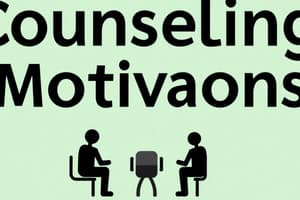Podcast
Questions and Answers
Match the reasons for becoming a counselor with their descriptions:
Match the reasons for becoming a counselor with their descriptions:
Desire to help others = Most believe they can really help people. Preventative approach = Some want to help prevent people from having difficulties. Empowering clients = Some want to help people reach their full potential. Addressing personal needs = Some have a need to solve his or her own problems.
Match the counselor interpersonal dimensions with their effects on counseling outcomes:
Match the counselor interpersonal dimensions with their effects on counseling outcomes:
Ability to convey understanding = The ability to listen and convey understanding without judgment. Cultural sensitivity = Is sensitive to cultural differences. Self-awareness = Has self-awareness and knows his or her own biases. Modeling behavior = Has the ability to model appropriate behaviors.
Match the characteristics of effective counselors with their definitions:
Match the characteristics of effective counselors with their definitions:
Ethics = Is ethical. Positive self-esteem = Demonstration of a positive belief in himself or herself. Altruism = Has the ability to be altruistic. Ambiguity tolerance = Has tolerance for ambiguity.
Match the potentially negative reasons for becoming a counselor with their implications:
Match the potentially negative reasons for becoming a counselor with their implications:
Match the positive counseling outcomes with their related dimensions:
Match the positive counseling outcomes with their related dimensions:
Flashcards
Active listening in counseling
Active listening in counseling
The ability to listen attentively and demonstrate understanding without judgment. It also involves conveying a genuine interest in the client's experiences.
Empathy in counseling
Empathy in counseling
The capacity to understand and share the feelings of the client, even if the counselor hasn't experienced the same situation. It involves recognizing the client's emotions and putting yourself in their shoes.
Self-awareness in counseling
Self-awareness in counseling
A significant personal characteristic of an effective counselor. It signifies that the counselor understands their own biases and prejudices and actively works to manage them in their interactions.
Tolerance for ambiguity in counseling
Tolerance for ambiguity in counseling
Signup and view all the flashcards
Professional development in counseling
Professional development in counseling
Signup and view all the flashcards
Study Notes
Motivations for Becoming a Counselor
- Most counselors want to help people.
- Some want to support those less fortunate.
- Some want to prevent problems before they happen.
- Some want to help people reach their full potential.
Potential Negative Motivations
- Counselors may have unrealistic expectations for helping people.
- Counselors may try to "fix" clients instead of supporting them.
- Counselors may have personal issues they need to address.
- Counselors may want power or influence.
Counselor Interpersonal Dimensions
- Effective counselors listen and understand without judgment.
- Effective counselors are sensitive, empathic, and patient.
- Effective counselors value clients' experiences.
- Effective counselors believe clients are trustworthy and capable.
Positive Counseling Outcomes
- Counselors demonstrate positive self-belief and self-esteem.
- Counselors are self-aware of biases and prejudices.
- Counselors consider cultural differences.
- Counselors tolerate ambiguity.
- Counselors model appropriate behaviors.
- Counselors are altruistic.
- Counselors are ethical.
- Counselors use themselves as vehicles for change.
Counselor Knowledge and Skills
- Counselors continuously learn about their field.
- Counselors find professional knowledge meaningful.
- Counselors respect diverse client perspectives.
- Counselors maintain good self-care strategies.
Self-Actualizing Counselor Characteristics
- Counselors tolerate uncertainty and dishonesty.
- Counselors are honest and accept themselves and others.
- Counselors have internal motivation and seek personal growth.
- Counselors prioritize helping others for their own sake.
- Counselors can handle solitude and stress.
- Counselors find satisfaction in personal growth, not external praise.
- Counselors have wonder about the world.
- Counselors show deep empathy and compassion.
- Counselors foster deep and meaningful relationships.
- Counselors avoid bias and discrimination.
- Counselors are ethical and have a good sense of humor.
- Counselors are creative and concerned with causes beyond themselves.
Additional Counselor Characteristics
- Counselors need high energy to attend to clients diligently.
- Counselors accept the risks and challenges of the profession.
- Counselors need to be comfortable handling ambiguity.
- Counselors support intimate client relationships.
Studying That Suits You
Use AI to generate personalized quizzes and flashcards to suit your learning preferences.




